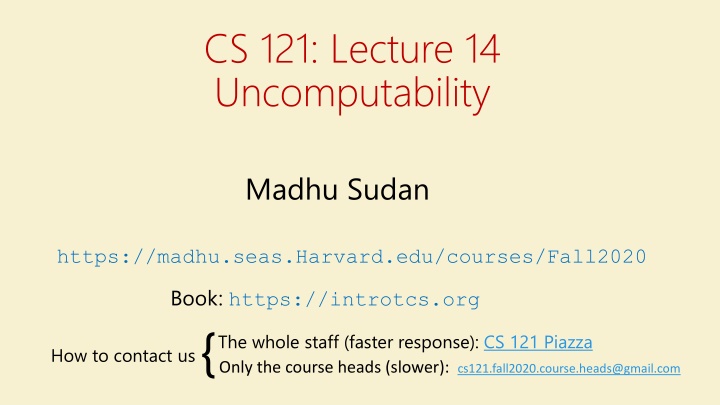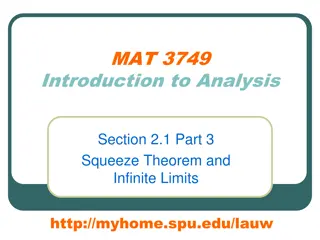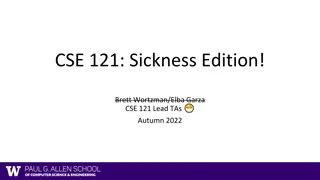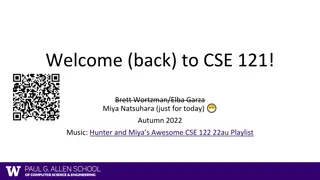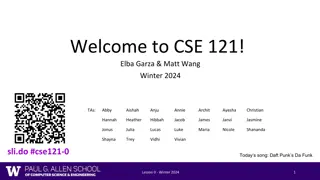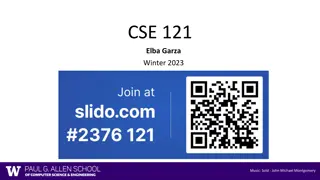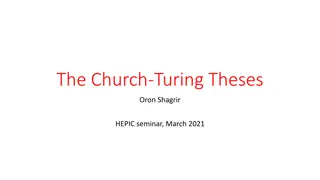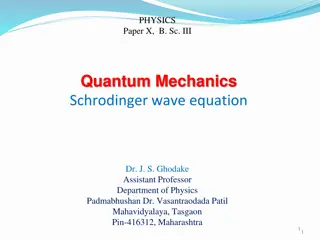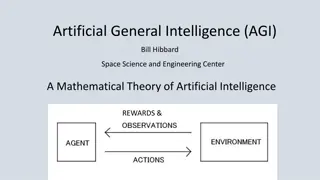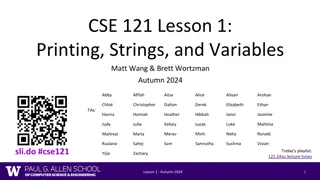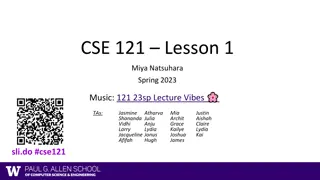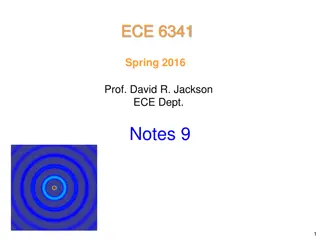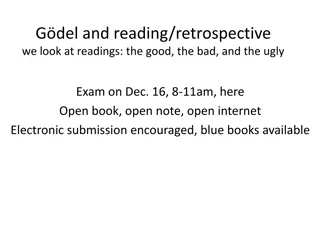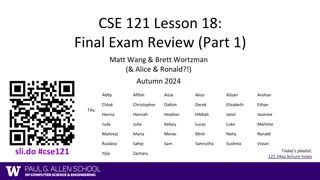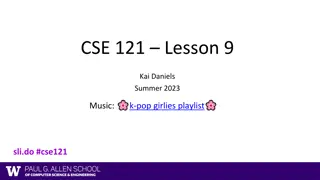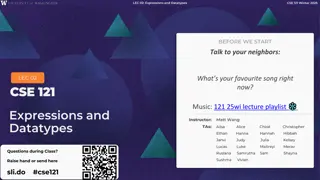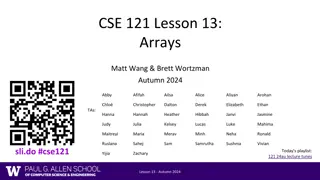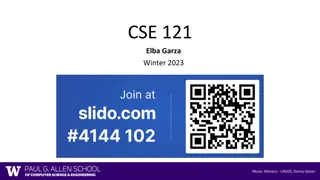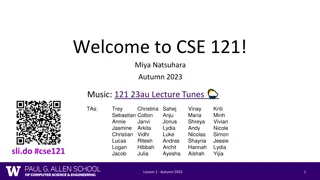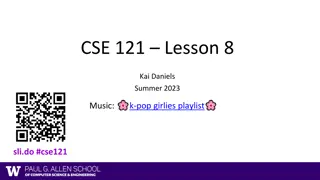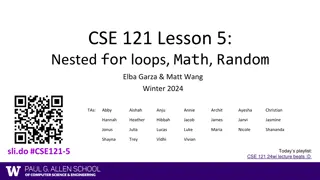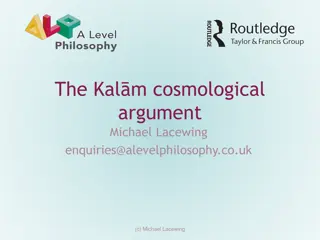CS.121 Lecture 14 Uncomputability: Finiteness and Infinities
Exploring the concepts of uncomputability, Cantor's proofs, and the relationship between finite and infinite sets in CS.121 Lecture 14. Dive into the world of computational limits and understand the implications of uncomputable functions using direct proof methods.
Download Presentation

Please find below an Image/Link to download the presentation.
The content on the website is provided AS IS for your information and personal use only. It may not be sold, licensed, or shared on other websites without obtaining consent from the author.If you encounter any issues during the download, it is possible that the publisher has removed the file from their server.
You are allowed to download the files provided on this website for personal or commercial use, subject to the condition that they are used lawfully. All files are the property of their respective owners.
The content on the website is provided AS IS for your information and personal use only. It may not be sold, licensed, or shared on other websites without obtaining consent from the author.
E N D
Presentation Transcript
CS 121: Lecture 14 Uncomputability Madhu Sudan https://madhu.seas.Harvard.edu/courses/Fall2020 Book: https://introtcs.org { The whole staff (faster response): CS 121 Piazza How to contact us Only the course heads (slower): cs121.fall2020.course.heads@gmail.com
Announcements: Midterm 1 graded. Solutions to be posted today-ish. Homework 4 due in 9 days. Thanks for participating in Midterm Feedback Survey.
Where we are: Part I: Circuits: Finite computation, quantitative study Part II: Automata: Infinite restricted computation, quantitative study Part III: Turing Machines: Infinite computation, qualitative study Part IV: Efficient Computation: Infinite computation, quantitative study Part V: Randomized computation: Extending studies to non-classical algorithms
Today: Finiteness and Infinities Cantor: #Reals > #Rationals (Uncountable vs. Countable sets) Uncomputable function by counting Explicit Uncomputable function: HALT
Background: Finiteness & Infinities Glossary of terms: = Natural numbers = Integers = Rationals = Reals 0,1 = ? 0 ? 1 Back prior to1800s: Understood finite vs. infinite Set ? is finite if ? s.t. 1-1 function ?:? [?] Infinite otherwise. Example infinite sets: , , 2, , 10 Thinking then: All of same size? No point comparing? , Cantor 1800s: ? ? 1 1 ?:? ? : Applies also to infinite sets. Examples: = = = 2= Thm: No 1-1 function ?: exists. ( < ) ?:? ? 1-1 (aka injective): ? ? = ? ? ? = ? ?:? ? onto (aka surjective): ? ? ? ? ?.?.? ? = ? 0,1
Cantors Proof Suppose 1 1 ?: 0,1 . Then onto ?: [0,1] Then can draw matrix with ? ??= ?th bit in binary expansion of ? ? . Consider ? = ? 00 ? 11 ? 22? 33 where does it lie? [Can t be ?th row.] Doesn t! Hence ?can t exist!
Uncomputable functions by counting Q1: How many computable functions are there? Claim: At most 0,1 Why? Q2: How many functions ?: 0,1 {0,1} Claim: [0,1] Put together: ? < |???|, where ? = ?: 0,1 0,1 ? is computable ; ??? = ?: 0,1 0,1 ? ??? ?
Exercise Break 1 Give direct proof a la Cantor that 0,1 < ALL ?: 0,1 0,1
Explicit Uncomputable Functions? Motivation: Are uncomputable functions of interest to us? Maybe they exist but can t even be described. (#describable functions = countable! By definition!) If they can t be described why would we be interested in computing them? Turns out: Many natural problems uncomputable. As we will see, the following (very describable!) problem is uncomputable. = 0 otherwise Will see in next lecture: HALT is uncomputable HALT ?,? = 1 if ? halts on input ?
An Explicit Uncomputable Function Cantor inspired by the diagonalization proof Idea: columns = 0,1 = inputs rows = 0,1 Turing machines ?th row, ?th column = (?,?) If row not TM fill with 0s. If ? does not halt on ? enter 0. Consider function that computes diagonal entries and flips them. Cantor ? = ?(?)
Exercise Break 2 Prove Cantor is uncomputable, where Cantor ? = ?(?)
Proof: Assume for contradiction that Turing Machine ? computes Cantor Then we have ? ? ? = ?(?) So ? ? = ?(?)|?=?= ?(?). Contradiction!!
Next Lecture: More Uncomputability Uncomputability of new problems HALT,HALT_ON_ZERO Two proof techniques Using presumed (non-existent) Turing Machine REDUCTIONS!!! Using a hard problem to show other problems are also hard.
